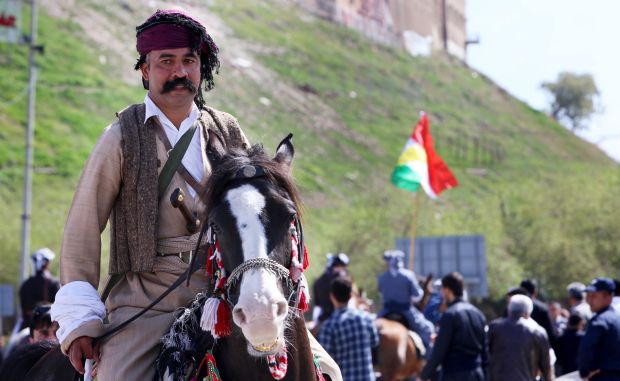
Iraqi Kurdish men, one holding the Kurdish flag (back), ride their horses during a commemoration marking the 23th anniversary of the uprising against the regime of toppled dictator Saddam Hussein in Erbil on March 11, 2014. (AFP Photo/Safin Hamed)
Erbil, Asharq Al-Awsat—Erbil, the capital of Iraq’s Kurdstan Region, continues to celebrate the eighth Freedom and Nowruz Festival this week, highlighting Arab and Kurdish local cultural traditions.
Also known as the Erbil Festival, the event is organized by Erbil’s Cultural and Art General Directorate and was launched on Tuesday with a number of senior Kurdistan Region Government (KRG) officials in attendance, as well as foreign officials and ambassadors. The first day of the festival saw an aerobatics show and a concert, along with exhibitions of traditional Kurdish folk music and dance.
The ten-day festival is set to end on March 20 with celebrations of Nowruz, the Kurdish New Year, and the lighting of the Nowruz flame.
This year, the Freedom Festival has witnessed larger turnout than ever before, with more Kurdish cultural and local traditions on show after Erbil was selected as the Arab Tourism Capital for 2014.
In a speech delivered at the opening ceremony, Erbil Governor Nawzad Hadi said: “March 11 marks a significant and great historical event: When the Iraqi–Kurdish Autonomy Agreement was signed in 1970, under which the Iraqi government recognized the national rights of the Kurdish people following the struggles and major sacrifices made by the Kurdish liberation movement.”
Hadi also paid tribute to the Suleimaniyah uprising of March 11, 1991, when “the people of the city and the Peshmerga forces managed to eliminate the entire Ba’athist system, allowing Erbil to enter a new phase during which it formed the government and the parliament.”
A ceremony marking the 23rd anniversary of the uprising against the Saddam Hussein regime saw Kurds, dressed in traditional garb, take part in a march through the capital’s streets, concluding with the launch of the Freedom Festival.
Erbil’s governor highlighted the Freedom Festival as promoting “peaceful coexistence among nations, religions and sects.”
Speaking to Asharq Al-Awsat, Tahir Abdullah, deputy governor of Erbil and head of the Festival’s organizing committee, said: “The festival will include a number of sporting, artistic and cultural events,” adding that the festival will also highlight traditional Kurdish and Arabic music, while a Georgian dance troop is also in attendance.
“The festival includes concerts, dances, cinema and other entertainment,” Abdullah told a press conference last week.
In comments to Asharq Al-Awsat, the deputy governor stressed that despite the financial difficulties facing the region, the Kurdistan Regional Government did not consider postponing or canceling the festival this year. Erbil and Baghdad have been locked in a battle over the Iraqi budget for 2014/15 and the allocation of funds to the Kurdistan region.
